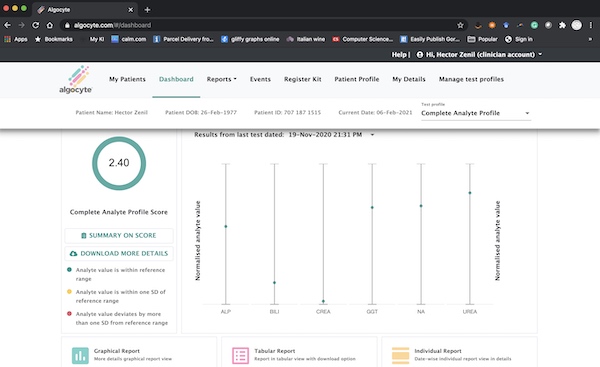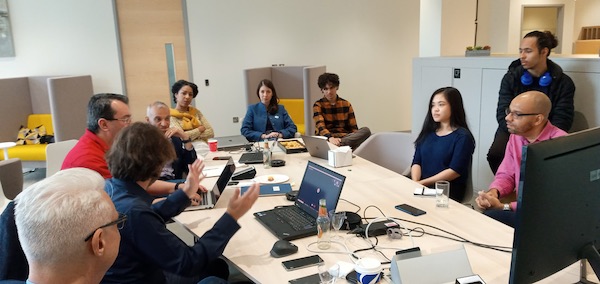This founder wants to detect diseases with AI
The startup Oxford Immune Algorithmics is part of the current class of the Leipzig SpinLab. It wants to detect diseases faster with the help of artificial intelligence.

Leipzig/Oxford. Only very few people have their blood checked regularly. Yet the lifeblood can reveal a lot about the body. Diseases such as diabetes, hepatitis, heart attacks and even cancer can be detected and combated at a very early stage.
To help more people take advantage of this opportunity, the startup Oxford Immune Algorithmics has combined three things: a mobile blood collection method, cloud servers and artificial intelligence. Co-founder Jürgen Riedel reveals what this is all about in an interview with Founderella.
Founderella: Mr. Riedel, with your company you are transferring the principle of machine learning to the human immune system. How does that work exactly?
Jürgen Riedel: Normally, when you are sick, you go to the doctor and often a blood analysis is then done. This ultimately provides information about the patient’s state of health. Together with my co-founder Hector Zenil, I would like to speed up this process. We have launched a portal in which data from blood tests is collected in the cloud and analyzed with the help of artificial intelligence. Users can take a few drops of blood from their finger using a test kit and then send a tube with the blood to us.
More interesting, however, is another variant we are currently working on. It will also be possible to analyze the distribution of white and red blood cells in a drop of blood using a method we have specially developed on site and send the data directly to the cloud.
How much time will this save?
Within five minutes the result is available when using the mobile method, whereas currently it can take several days if patients first go to the doctor and then the blood sample is sent to the lab.
By using our algorithm, the data can also be correlated with the patient’s past blood tests. In addition, part of the concept is that we don’t have to match them with the blood values of a large number of other people, but rather create an individual model for each user using our artificial intelligence.
If a questionnaire about general well-being is then filled out, we get a pretty comprehensive picture. This makes it possible to identify dangerous patterns at an early stage and even prevent the development of a variety of diseases.

In what cases might this be important?
For example, in the case of blood poisoning. Every minute counts there. After one or two days, patients may have to be amputated or they may be dead. Another case is the distinction between a bacterial and a viral infection. Only in the first case antibiotics are useful. With our method, this can be determined immediately and thus the unnecessary use of medication can be avoided.
What is your position on data protection? In the case of other providers such as “23andMe”, for example, where genes are evaluated, the question has arisen as to how they protect the sensitive information of their customers if money is to be made from it at the same time. Can you reassure your customers about this?
For us, privacy and confidentiality of personal information is extremely important. We adhere closely to regulatory laws and obtain all necessary certifications for all markets in which we operate. Only the patient or trusted physician should have access to personal and medical information.
Fundamentally, we are not about collecting as much data as possible. That’s what differentiates us from the social media giants, for example. We build models that we use to identify causal relationships and make predictions. We collect the data needed for this very sparingly. Whether the patient then makes it available to his family doctor or other institutions so that he can be treated quickly is something that everyone has to decide for themselves.
We are in a time of Corona crisis and Brexit. What opportunities do you see in this situation of upheaval?
Very good ones indeed. Because of Corona, many patients don’t dare to go to the doctor. The possibility of doing a blood test yourself at home is a good way out. At the same time, telemedicine is developing further and further. In combination with our application, there is great potential to improve patient treatment. By the way, Brexit is playing into our hands. A lot of things are currently being reorganized in the UK. In the healthcare sector, those responsible are also prepared to go down new paths in the interests of cost savings.

Speaking of costs. What does your business model actually look like?
We are planning a subscription model for the service and are also negotiating with health insurance companies. I can’t name an exact price yet. But I assume that it will be in the range of ten euros or even significantly less, which is what a blood test currently costs. However, we want to offer more for the money. As already described, the blood values themselves are rounded off by an extensive evaluation by the algorithm.
Finally, a question about your Leipzig commitment. As an award-winning startup from Oxford University, how come your chose Leipzig to participate in the current class of SpinLab?
For one thing, we think Leipzig is a particularly dynamic startup metropolis. There is a creative atmosphere and a willingness to break new ground. In addition, research and business are closely linked, which you can see well in institutions like Bio City. It is also important for us to establish a company headquarters in Germany after Brexit in order to work the attractive EU healthcare market from there.
Interview: Stephan Hoenigschmid

